
What to visit Chau Doc and its surroundings?
- on Dec 1, 2019 By: BN
Stretching along the Hau Giang or Bassac River, close to the Cambodian border, the Chau Doc fluvial town is a destination full of charm and surprises that are popular with travellers wishing to deviate from the beaten path during their discovery of the Mekong Delta region. A commercial hub located on the trans-Asian axis, Chau Doc allows you to continue, by road or by water, to the kingdom of Cambodia. But do not make this city just a stopover. Chau Doc and its surroundings alone justify an extended stay in this beautiful corner of the Mekong Delta.
Discover Sam Mountain
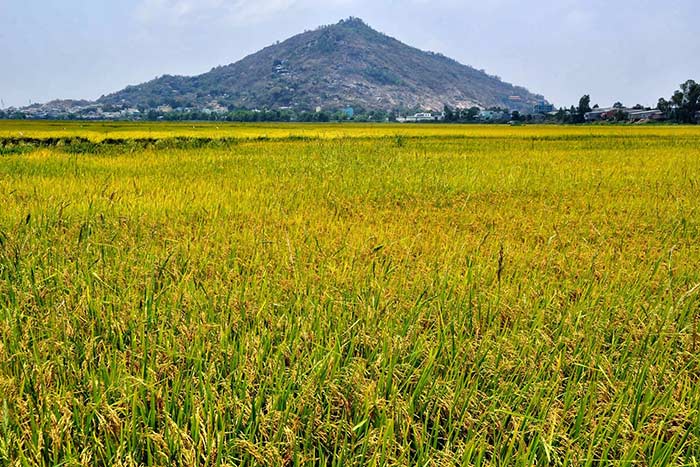
Located just 6 kilometres from Chau Doc, this 230-metre-high mountain offers breath-taking views of the Mekong Delta countryside lined with large expanses of rice fields bristling with sugar palms. It’s a great reward for those who have climbed the countless steps leading to the summit. This sacred mountain for the Vietnamese, which breaks with the flatness of the delta, is a Mecca of Buddhist pilgrimage. Many temples and pagodas bathed in layers of incense that are scattered at the base and on the slopes of the hill.
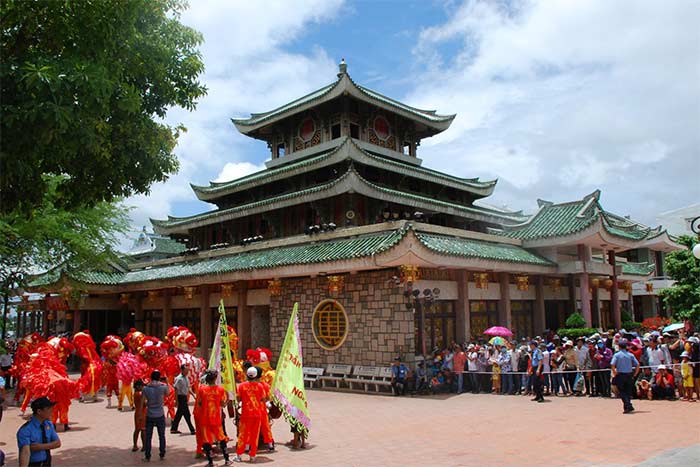
The temple of the Queen of the Country or Mieu Ba Chua Xu in Vietnamese, was founded in 1820 and is dedicated to the Goddess Xu. Originally constructed of bamboo, the temple was later tiled and rebuilt in stone in 1976. Pilgrims come in large numbers to make offerings to the statue of the goddess of great artistic value, dating from the 6th century. It was inspired by the motifs of Vishnu statues, common in Laos, Cambodia and India. Once a year, from the 23rd to the 26th day of the 4th lunar month, the temple becomes a high place of pilgrimage.
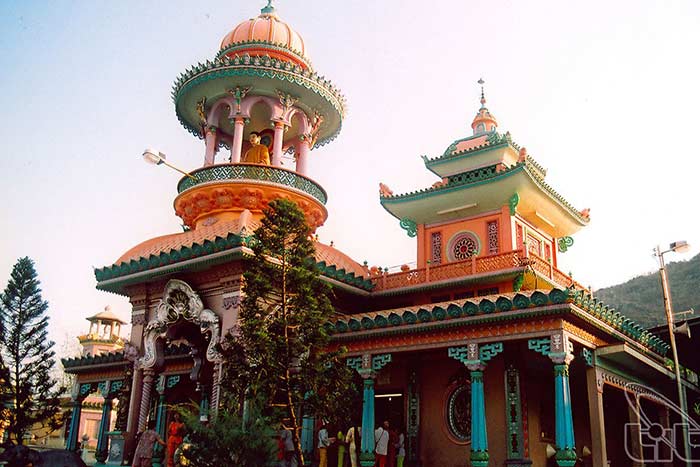
The Tay An pagoda, also located at the foot of Sam Mountain, is a sanctuary distinguished by the originality of its colourful style mixing Hindu, Islamist and Buddhist forms. Dating from 1847, it was restored in 1958. The pagoda is beautifully decorated with many wooden statues, representing Buddha or Hindu figures. The 15th day of the 1st month, the 7th month, the 10th lunar month are the days of festivities during which pilgrims come from all over the country.
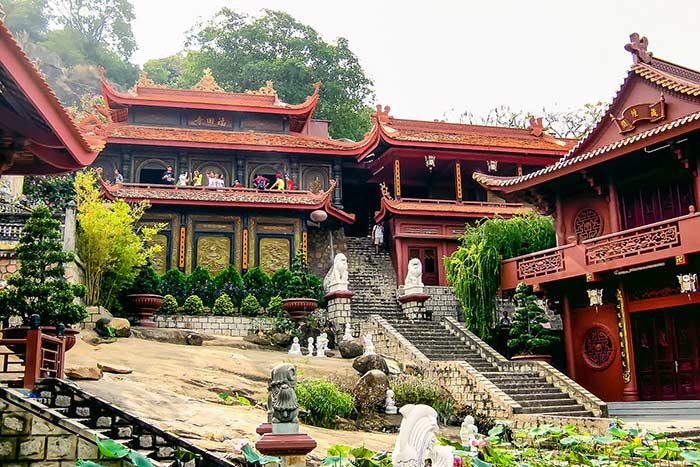
Finally, there is the Cave Pagoda, called in Vietnamese Chua Hang or also Phuoc Dien Tu, located halfway on the west side of the mountain. The lower part includes the dwellings of the monks and houses two hexagonal tombs, that of the founder of the pagoda, a seamstress named Le Thi Tho, and that of a former master bonze, Thich Huê Thien. The upper part houses an astonishing set of caves and caverns, and the main sanctuary contains statues of A Di Da, the Buddha of the past, and the Gautama Buddha, who laid the foundation for the formation of Buddhism.
Take a boat ride through the Tra Su Cajeput forests
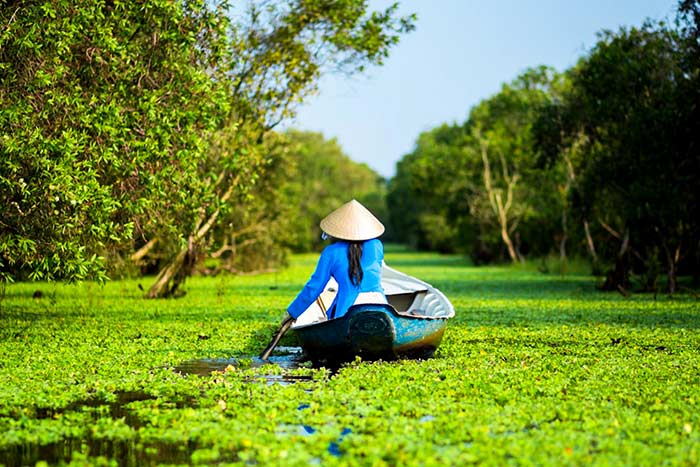
Stretching on for about 850 hectares and located 30km from Chau Doc Town, the Tra Su Cajeput forests are a haven of peace that will allow you to reconnect with nature. This place is a Mecca of ecotourism and a typical ecosystem of the Mekong Delta wetland. Embark on a boat and let yourself be led by a rower through a green stream where the water is all covered with duckweed like a large natural green carpet. A restful calm that gently disturbs by the many species of birds that have made this magical place a sanctuary. An observatory has been built to give you an overview of the entire nature reserve.
Explore the Chau Doc floating village
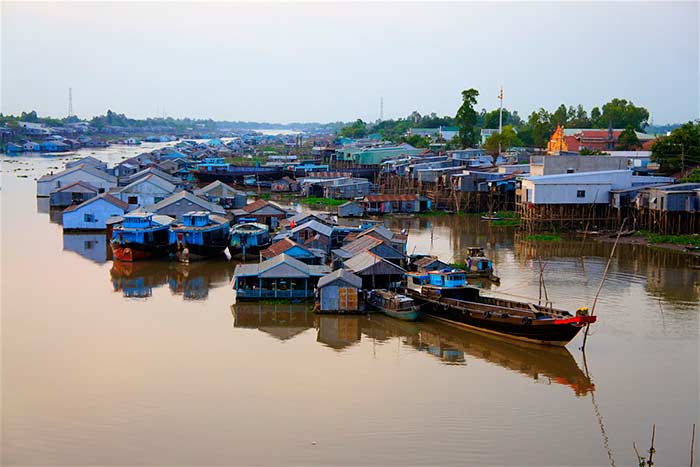
Chau Doc floating village has a large majority of fish farming families whose heavy wooden floating houses on the Bassac are used as living quarters and breeding grounds for Asian catfish (Panga). During a pleasant boat trip, you can observe the traps under these floating houses. Floating cage culture is one of the cultural traits of the Mekong Delta. There will be beautiful scenes of life to discover and a unique experience to try.
Meet Cham and Khmer ethnic minorities
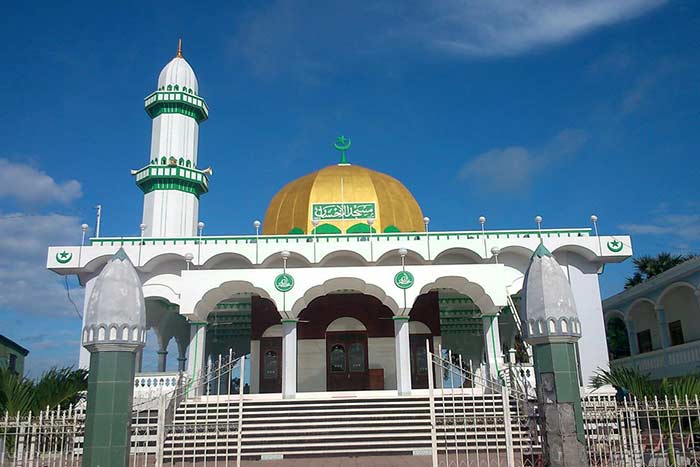
Many Cham and Khmer people live in Chau Doc and its surroundings. You can visit one of the many villages of the Cham ethnic group such as Da Phuoc with its many wooden houses on stilts and its beautiful Masjid Al Ehsan mosque. Built in 1937, it was renovated in 1992 and has an ethereal beauty, especially when it is flooded with the sun. This is an opportunity to discover the culture, the crafts and to enjoy the taste of local cuisine. You can observe the presence of an important Khmer community through the many pagodas with the typically Khmer architecture of Theravada Buddhism and during some festivities like the famous pirogue races that take place in October.
Related articles:
>> 4 reasons to explore Chau Doc - An Giang, an unforgettable spot in the upstream of Mekong Delta
>> Ben Tre Vietnam: top activities to do in the land of coconut
>> What to do in Can Tho, charming city of the Mekong Delta?
Comment
Other Blog
Categories
Latest News
on 27 Apr, 2023      
on 15 Apr, 2023      
on 28 Mar, 2023      
 Español
Español Français
Français



















F
on Jan 3, 2024Igor Mozetic
on Apr 8, 2023Ira Beale
on Feb 10, 2023Phạm Phú Toàn
on Jan 28, 2023Max Stover
on Jan 11, 2023